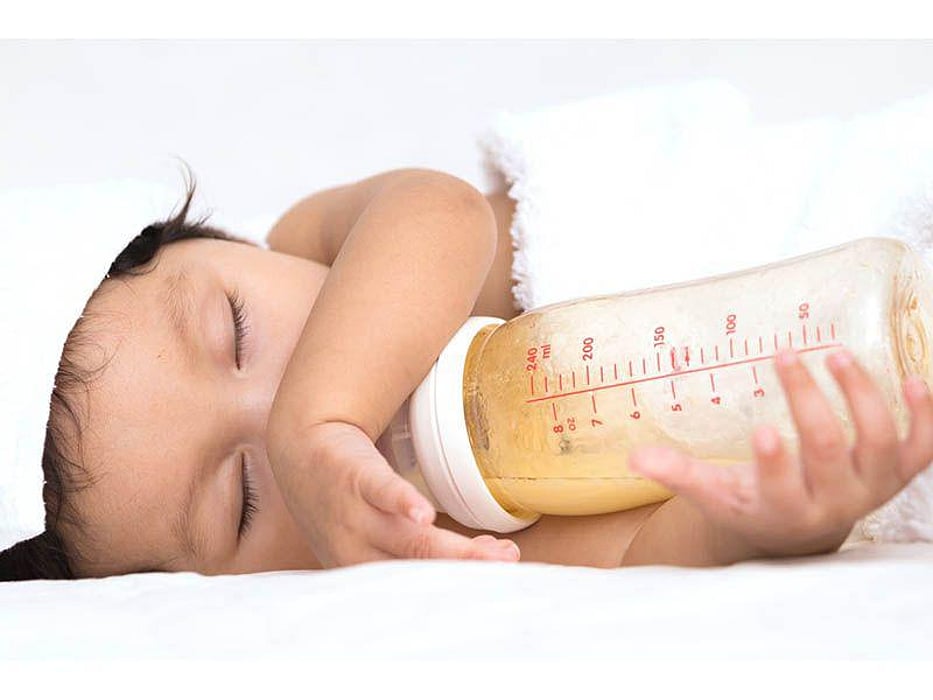Baby Bottle Tooth Decay

If your child is old enough to have teeth, he's old enough to have tooth problems. For infants and toddlers, the biggest threat to dental health is baby bottle tooth decay. Here's what you need to know about this common -- but largely preventable -- problem.
What is baby bottle tooth decay?
Milk, apple juice, formula -- just about everything young children drink contains sugar. When a child drinks from a cup, the sugar moves past the teeth very quickly and does little harm. But when a child slowly sucks on a bottle, the sugar lingers in the mouth. Bacteria break down the sugar and turn it into acid. Over time, the acid can start eating away at the enamel on a child's teeth, most often the upper front teeth. This is called baby bottle tooth decay.
It's not something to take lightly. Severe cases can destroy teeth, making it harder for a child to chew or even talk clearly. Down the road, it could also lead to many hours in the dental chair or years of braces. According to the American Dental Association, children who lose their baby teeth too early are more likely to grow up with crowded or crooked permanent teeth.
How can I prevent baby bottle tooth decay?
The best way to prevent baby bottle tooth decay is to limit your child's time with a bottle, especially at bedtime. Give him a bottle at mealtime, but don't let him suck on it throughout the day. If sucking is soothing to your child, give him a pacifier. Above all, don't put him to bed with a bottle (unless it contains nothing but water). Clamping down onto a bottle of juice or milk all night is the ideal way to start decay.
Here are some other ways to protect your child from tooth decay:
- Avoid giving a baby or toddler soda, juice, or sugar water in a bottle.
- Don't dip your child's pacifier in sugar, juice, honey, or any other sweet stuff. Also, never give babies a honey-filled pacifiers -- some babies have developed botulism from them.
- As soon as possible, teach your child how to drink from a cup (a lot of people swear by sippy cups, which are sort of an intermediate step between a bottle and a real cup). Most kids are ready by the time they turn one. By the time they reach 14 months, a bottle should be unnecessary.
- Whether your child drinks from a bottle, cup, or juice, he shouldn't have free access to drinks (other than water) throughout the day.
- Pure fruit juice can be part of a healthy diet, but be aware that those vitamins come with a lot of sugar. (Of course, artificial "fruit drinks" can be even sweeter than the real thing.) According to the American Academy of Pediatrics, children under six shouldn't have more than four to six ounces of fruit juice per day. Some parents dilute their child's juice with water to reduce the amount of sugar.
- You can help prevent decay. Even before your child has teeth, gently wipe his gums with a damp cloth after each feeding. Brush your older children's teeth twice a day with a soft, wet toothbrush (and a pea-sized amount of toothpaste for children older than 2), but don't give a baby or toddler fluoride toothpaste unless a doctor recommends it. (Excessive fluoride can lead to a condition known as flourosis, which is actually harmful to teeth.)
Baby teeth don't last forever, but they still need to be treated with care. By taking steps to prevent baby bottle tooth decay, you'll give your child an excellent start for a lifetime of healthy teeth.
References
American Dental Association. Baby Bottle Tooth Decay( Early childhood tooth decay). https://www.mouthhealthy.org/en/az-topics/b/baby-b...
American Academy of Pediatric Dentistry. Perinatal and Oral Health. Care. https://www.aapd.org/globalassets/media/policies_g...
American Academy of Family Physicians. Fighting the Silent Epidemic of Poor Oral Health. Am Fam Physician; 15;75(4):475-476.
American Academy of Pediatrics. Treating Tooth Decay. https://www.aapd.org/globalassets/media/policy-cen...
American Dental Association. Life Stages: Parents. http://www.ada.org/public/manage/stages/parents.asp
Photo credit: Shutterstock
Related Posts
Kids’ Dental Health: Quiz
1. You should start brushing your child's teeth as soon as the first one...
Mantener la presión arterial a raya podría reducir las probabilidades de demencia
MIÉRCOLES, 26 de octubre de 2022 (HealthDay News) -- Controlar la hipertensión,...
White Matter Hyperintensity Burden Up for Postmenopausal Women
WEDNESDAY, July 6, 2022 (HealthDay News) -- Postmenopausal women appear to have...
Dormir bien de noche podría potenciar su vacuna
MARTES, 14 de marzo de 2023 (HealthDay News) -- Quizá sea posible lograr que su...
